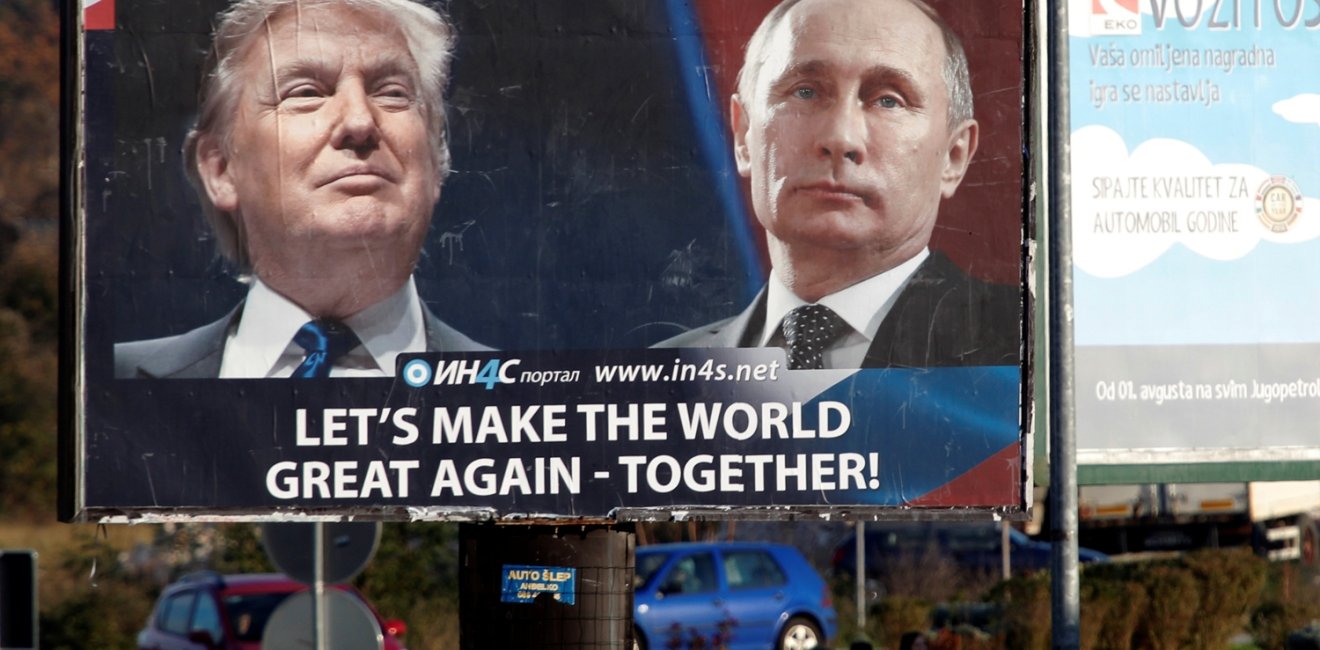
A blog of the Kennan Institute
The stormy debate over the Russian computer hacks, the complicity of the Kremlin, and whether they threw the election for Trump will continue for some time. Less debatable is that Trump has signaled warmer relations with Moscow. Speaking of his future self in the first person, during his campaign Trump the candidate proudly proclaimed that "President Trump would be so much better for US-Russian relations.” And whether or not the Russian leadership truly believed Trump would win, by some accounts champagne corks were popping in Russia’s corridors of power after Trump’s victory.
If Trump stays true to his campaign rhetoric – though given his capriciousness, that is no small “if” – we can expect a warming of US-Russian relations from their current state of frostiness. True, Congress, including a number of Republicans, will likely raise tough questions about any détente with Russia. But at the end of the day it is the Executive branch that will direct the country’s foreign policy.
If President Trump’s actions follow his campaign oratory, what will Russia do without the U.S. as an enemy?
The results might mean less support for Ukraine and NATO, and a lessening or outright dismantling of sanctions, any of which would provide a significant boost for Russia’s leaders. To this one could add at least the appearance of victory in Syria, and the wave of populism sweeping Europe, much of it led by anti-establishment types who see Putin as more ally than adversary. No wonder some are claiming that “It’s Putin’s world now.”
Perhaps. But even though he may not realize it yet, the ground under Putin’s feet has now shifted. One problem is that as troubling a candidate as Trump was, in an ironic sense American democracy prevailed: the candidate essentially anointed by much of the country’s political and media elite was brought down when a huge part of the population simply ignored that expert opinion. With Putin himself now facing re-election in 2018, this is one lesson that can’t sit well with the Kremlin.
Sure, in a pinch, Putin can always rig elections. But a bigger problem is that if the US is no longer Russia’s enemy number 1, Putin will have no one else to blame for the sorry state of Russia’s economy.
Discontent was already clear following his last re-election to the presidency in 2012, when mass protests broke out in Russia’s major cities over vote-rigging and corruption. Then, Putin and his acolytes kicked their nationalist rhetoric into high gear. The protests happened, Putin explained, not because of crooked elections, but because Secretary of State Clinton “sent a signal” to traitors in Russia’s midst. Alongside claims that the US was trying to impose a “color revolution,” Western-backed NGOs in Russia were forced to register as “foreign agents.” The 2014 Maidan revolution in Ukraine was not, Russians were told, a popular uprising against a corrupt president, but a “fascist coup” orchestrated in Washington. With the West encroaching still further on Russia’s borders, the seizure of Crimea – “Crimea is ours!”— proved hugely popular. Putin’s popularity ratings soared, and polls showed that the percentage of Russians viewing the US favorably plunged from 57 percent in 2010 to 15 percent in 2015.
The heated anti-Russian rhetoric of the US presidential campaign, coming almost exclusively from supporters of Hillary Clinton (presumed by most to be the President-elect) only added fuel to the flames of Russia’s state-controlled media claiming that the country was under siege, and that Russians should seek out the location of their nearest bomb shelter.
But if President Trump’s actions follow his campaign oratory, what will Russia do without the US as an enemy? The Russian people credit Putin with reviving their economy after the disastrous 1990s. Yet much of the thanks goes to high prices for oil, which have now dropped roughly by half. The ruble has plummeted in value, real wages have fallen, and Russian workers – long presumed to make up the backbone of Putin’s popular support – are protesting in increasing numbers, as, in some cases, wages simply aren’t being paid at all. According to the World Bank, half of all Russians are at risk of falling into poverty. True, the Russian economy may not decline further, but continued stagnation looks quite likely through the foreseeable future.
Putin has blamed U.S. and EU sanctions for Russia’s economic hardship. In fact, before Trump’s election, he demanded that the US pay for the harm caused by the sanctions (including his own counter-sanctions) as a condition for improved cooperation with the US. A Trump presidency might lead to sanctions relief, but the impact for the average Russian is likely to be limited.
Russians have never experienced a prolonged economic slump in the 16 years that Putin has been president (the 2009 recession was deep but short). Without a hostile U.S. to blame, Putin will be challenged to explain why Russian cupboards are increasingly bare. His Prime Minister Dimitrii Medvedev had trouble doing so, when he recently told angry pensioners in Crimea, “There’s no money. But you hang in there!”
Hyper-nationalist rhetoric may lose its resonance when, in the Russian metaphor, the propaganda of the TV loses out to the reality of the refrigerator. There are signs that such a shift is already underfoot. Polling data from the Levada Center, Russia’s lone independent survey firm, finds that Russians are more likely than a year ago to judge their government in terms of their personal well-being, and less likely to see Russia as having its own special path.
The Russian economy faces serious long-term structural problems. In such conditions, Russia’s foreign policy adventures will likely become increasingly unsustainable. This is hardly “Putin’s world.” There may be euphoria in the Kremlin for a time. But as its own presidential elections draw closer, Russia’s leaders might want to remember the ancient proverb: “Be careful what you wish for. You might just get it.”
The opinions expressed here are solely those of the author.
Author

Professor and Chair, Department of Politics, Oberlin College

Kennan Institute
After more than 50 years as a vital part of the Wilson Center legacy, the Kennan Institute has become an independent think tank. You can find the current website for the Kennan Institute at kennaninstitute.org. Please look for future announcements about partnership activities between the Wilson Center and the Kennan Institute at Wilson Center Press Room. The Kennan Institute is the premier US center for advanced research on Eurasia and the oldest and largest regional program at the Woodrow Wilson International Center for Scholars. The Kennan Institute is committed to improving American understanding of Russia, Ukraine, Central Asia, the South Caucasus, and the surrounding region through research and exchange. Read more

Explore More in The Russia File
Browse The Russia File
Chechnya as a Model of Modern Russia

Russia’s Indigenous Communities and the War in Ukraine

Gas and Power in a Changing US–Russia Relationship

